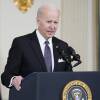President Joe Biden is starting to warm up on his campaign promise to cancel student loan debt, but he has backed off canceling it outright and signaled moving toward a tiered model or a flat $10,000 cancellation. That move has pros and cons in the political and economic arena, experts told host Crystal Haynes on Greater Boston.
Michael D. Cohen, CEO of Cohen Research Group, said student debt cancellation carries problems with inflation, cost and culture. Cohen said canceling the debt will add more money into the economy and make inflation worse.
"If you forgive the debt, they're not actually taking care of the real problem with this, which is actually the tuition costs," he said. "You're not actually going to reduce any of that."
When it comes to culture, Cohen said forgiving the debt breaks a social contract with people who worked incredibly hard to save for college, which could cause frustration.
Alana Semuels, senior economics correspondent for TIME Magazine, said many loans were administered by servicers unfairly, with sky-high interest rates that make it impossible to even touch the principal loan amount.
"It's almost hard for me to understate the number of people that I've talked to that are just completely crippled by student loans, and they just see no way out," Semuels said. She added that canceling the debt would allow more people to accomplish things such as buying a house or having children.
Both Semuels and Cohen noted that Biden will be walking a tightrope trying to create a solution to the crushing student loan debt problem while also trying to fulfill his campaign promise.
Watch: Will President Biden make good on his promise to forgive student loans?







